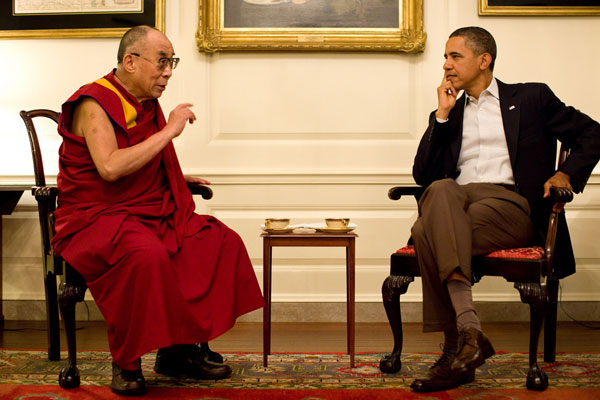
James Warren of the Chicago News Cooperative makes a good, necessary point about Barack Obama, even if I don’t entirely agree with his conclusions, in "Get Over It: This Is Who Obama Is":
In a showdown with ideological enemies, he fashioned compromises that made some Democratic allies apoplectic. Republicans weren’t happy, either, with what he wrought but grudgingly realized there were few alternatives.
Throughout, Obama exhibited a preternatural calm, always seeking some common ground among disparate interests as though compromise was a goal in and of itself, not any diminution of principle, as some Democrats thought.
Yes, that’s our president, the man at the center of the improbable Debt Debate of 2011. But it was also state Sen. Barack Obama a decade ago. The equally rancorous issue back then was the death penalty, and the setting was the Illinois Legislature. Not much about him has changed.
[snip]
[F]or Obama, [community organizing] also meant a strategic set of notions about finding mutual agreement among people with the most divergent of motivations, according to Obama mentors whom I know from back then and David Maraniss, the journalist-author now working on an Obama biography.
And it was also Harvard law student Barack Obama, well before that:
The law school generally at that time was riven ideologically, and not just in terms of Republican/Democrat partisan politics, but there were contending schools of legal thought at the time, represented on the faculty, that really polarized both the faculty and the student body. There was a far-left group of professors who adhered to what was known as critical legal studies, and then there were a handful of conservative professors, like Charles Fried, who had served in the Reagan administration. There were intense debates over affirmative action and race issues. This is, after all, just a few years after the end of the Reagan presidency.
[snip]
The block of conservatives on the Law Review my year I think was eager to avoid having any of the most political people on the left govern the Review.
[snip]
I think Barack took 10 times as much grief from those on the left on the Review as from those of us on the right. And the reason was, I think there was an expectation among those editors on the left that he would affirmatively use the modest powers of his position to advance the cause, whatever that was. They thought, you know, finally there’s an African American president of the Harvard Law Review; it’s our turn, and he should aggressively use this position, and his authority and his bully pulpit to advance the political or philosophical causes that we all believe in.
That’s from Bradford Berenson, who served as an associate White House council under George W. Bush.
I think Warren’s right about who Obama is, and also about getting over it, at least insofar as not having false or unreasonable expectations. But that goes for Obama too, and that’s one thing the left is criticizing the President over that doesn’t factor into Warren’s praise for his tendency to "take what he can get": whether he’s getting what he can.
Consider: the White House has taken the 14th Amendment off the table. They haven’t threatened a veto. They haven’t just said we’re going to keep paying the country’s bills, so tough. They haven’t held the Bush tax cuts hostage. About the only thing the White House has come out against is a short-term deal.
Meanwhile, here’s John Boehner explaining where the House Republicans are coming from:
[A] lot of them believe that if we get passed August the second and we have enough chaos, we could force the Senate and the White House to accept a balanced budget amendment. I’m not sure that that — I don’t think that that strategy works.
And Boehner’s line hasn’t been that much softer:
Boehner has rejected every possible compromise offered to him, and now plans to unilaterally hold a vote on the one thing — the only thing — that he knows Obama won’t accept.
But Boehner said he couldn’t understand why any Republicans would position themselves with Democrats opposing his plan.
“Barack Obama hates it, Harry Reid hates it, Nancy Pelosi hates it,” he said, naming off the Democratic leadership.
One way of looking at it is that by "seeking some common ground among disparate interests as though compromise was a goal in and of itself" in response to parties whose strategy is the exact opposite—intransigence as a goal in and of itself—Obama has negotiated himself into a corner in dealing with a level of political intransigence he hasn’t encountered in his career:
Obama clearly faces a perception problem. Republicans may complain that he’s walked away from deals, but they really think he’s a pushover who will cede more and more ground the harder and longer they push. That’s a dangerous position to be in on the verge of a high stakes game of chicken. It encourages the Republicans to push the envelope farther and farther — even to walk away from a deal they regard as a win in search of an even better win.
Meanwhile, the Boehner plan seems to have the most momentum right now, as he tells his colleagues "get your ass in line." Which, sometimes, adults say too.
Photograph: White House


